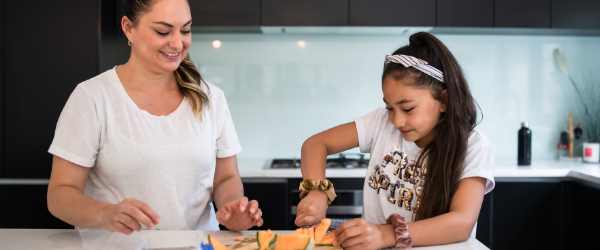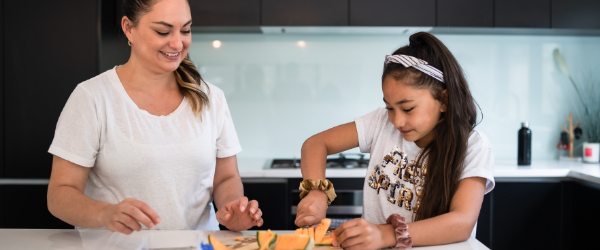
Talking To Your Kids About a Healthy Lifestyle
 The most well-meaning comments can have a big impact on a child’s body image and long-term relationship with food. There’s a delicate balance between talking to children about healthy eating and instilling unhealthy relationships with food. We hope these tips help you!
The most well-meaning comments can have a big impact on a child’s body image and long-term relationship with food. There’s a delicate balance between talking to children about healthy eating and instilling unhealthy relationships with food. We hope these tips help you!
It starts with you and how you feel about yourself

Talk about your body kindly. Avoid discussing diets, losing weight, or how sugar is going to “wreck your diet” or “make you fat.” It’s also important that the way you speak about others can also have an impact on your children. Even if they are subtle, kids will pick up on the smallest details and then reuse that information later on. If those comments are positive ones like “Oh, she has the best make up” or “I love his style”, watch how quickly your child will start complimenting people.
On another note, when it comes to exercising don’t shame your body in front of your children, or yourself for that matter. Tell yourself and your kids that you’ll be going for a walk because you love to walk, or going to the gym so that you can feel better/happier. Making it a chore will not only be miserable to you but create the connection for children that exercise=skinny which equals happiness.
Change up dinner time

Remember when you were a kid and you couldn’t leave the dinner table until you finished all your peas. Bet you don’t love peas that much anymore do you? And if you do eat them, I’m sure that you have flashbacks to that moment. It’s time to switch up meal time with your family. No more bribing your kids to finish “one more bite” by offering dessert. If they don’t want any more, that’s their choice. It’s your responsibility to provide the food and that’s it.
The same goes for other fruits, veggies or proteins. Forcing your kids to finish a piece of barbecued chicken isn’t the answer to them enjoying it. Understand that kids need to have a lot of exposure to a certain type of food before they can really tell if they enjoy it or not. Consider changing up a sauce, changing the way you cook it, making it fun and see if that makes a difference.
Remember, food is food

Overtime we get a concept of what is “good” food and what is “bad” food but those concepts are learned by listening to others and how they talk about their choices. Labeling foods as “bad” will negatively impact the relationship your child has with that food as they grow. This isn’t an invitation for your kids to eat 5 ice cream sandwiches but having a normal grocery order that involves “regular” food with some then also some “fun” food. In the end, it’s all just food.
Enjoy sweets and snacks with your child

You want to show your children that you can have sweets with them too. You can also choose not to have them. If you don’t want a sweet with your kid simply say “I’m okay right now, I’m full and don’t really feel like having it”. Don’t say “Sorry, sweetie I’m on a diet”.
Don’t weigh-in in front of your children

This doesn’t mean you have to throw out your scale in the bathroom but it also doesn’t need to be the focal point. If you’re interested in what your weight is at home, make it a private occasion to go and check. If you’re at your appointment with us, kids can colour outside in the waiting room. If kids do need to come into the consultation room, consider not weighing in that week. Our clients can always do it next week or pop in for an express weigh-in later that week when the kids aren’t around.
Don’t put them on a diet or talk about their weight

If your kid is overweight it can cause them problems. Continue to model good eating behaviours, encourage family meals and activity outside, etc. An American Academy of Pediatrics (AAP) Clinical Report suggests that among children, dieting with the goal of losing weight is a risk factor for both obesity and eating disorders. One study found that girls who weren’t obese who dieted in the 9th grade were three times more likely to be overweight in 12th grade compared to girls who didn’t diet. The case against dieting among kids is so strong that the AAP says it’s counterproductive to managing weight.
What do you say to your child about coming to Simply For Life?

Mom’s getting help to improve my eating habits, learn some new recipes, get meal ideas for our family and to improve her energy. Don’t focus on weight or dieting during conversations about healthy eating. Eat together as a family as much as possible. You should try to eat the same thing at supper. Remember, you’re in control over what is served. Talk to your consultant about meals your family loves or what will make things easier for you when planning meals. Don’t make a “special” meal for yourself or bring meals to events or occasions. If you are having something different than everyone else, just say it’s because this is what you feel like having right now. Instead of, “I am eating this because I’m trying to lose weight” or “I’m eating this because I’m on a diet”. Remember, we are trying to create healthy habits that last for life. You’re not on a diet and if you feel like you are, please talk to your consultant so they can help you.
